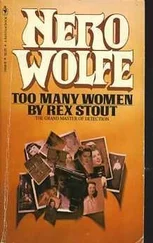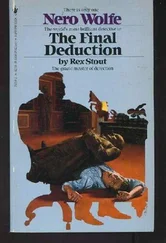Not being a psychologist or a sociologist, I wouldn’t know how a middle-aged widow with a double chin is supposed to react on entering a bower that her husband had used for extramarital activities, but whatever the pattern is I’ll give any odds you name that Mrs. Thomas G. Yeager didn’t follow it. When I switched on the lights she took a couple of steps, stopped, moved her head slowly around to the right, moved it back more slowly and to the left, and turned to face me.
“I apologize,” she said.
“Accepted,” I said. “Forget it.”
She took a few more steps, stopped for another look around, and turned again. “No bathroom?”
I believe it only because I heard it. You haven’t that privilege. “Sure,” I said, “at the far end. The kitchen’s at this end.” I pointed. “That gold push plate is on the door.” I swung my arm around. “There where the silk is tucked; it’s a curtain. Drawers behind it.”
That ended the conversation, though her inspection took more than half an hour. First she took in the pictures, not collectively, one by one, moving along, tilting her head back for the high ones. No comment. When she slid the curtain aside and began opening drawers I went to a chair and sat. She took nothing out of the drawers and didn’t poke in them. She stooped over for a close look at the carpet. She examined the upholstery on the chairs and couches. She twisted her neck up and around to survey the indirect-lighting installation. She pulled the top of the bed coverlet down to see the linen and put it neatly back again. She was in the kitchen a good five minutes, and in the bathroom longer. She did the bathroom last, and when she came out she got her stole from the couch where she had put it, and spoke.
“Do you believe that Julia McGee came here to take dictation?”
“No.” I rose. “Do you?”
“Certainly not. Why do you think the person who killed my husband killed that girl?”
“It’s complicated. But it’s not just a guess.”
“Where’s her mother? I want to speak to her.”
“Better not, right now.” I was moving toward the elevator, and she was coming. “It hit her pretty hard. Some other day.” I pushed the button, the elevator door opened, and we entered
Just to get it straight for my own satisfaction, I have tried to figure exactly where we were when the doorbell rang in the basement. We must have been either entering the elevator or on our way down. Anyhow, I didn’t hear it, so we emerged below and started up the hall. When we were about halfway to the front Mrs. Perez came out of a door ahead on the right, the one she and Maria had come out of when her husband called her my first time there, went to the street door, and opened it. As I say, I hadn’t heard the doorbell, so I supposed she was going out. But she wasn’t. Mrs. Yeager and I were right there when Sergeant Purley Stebbins said, “Sorry to bother you again, Mrs. Perez, but—” saw us, and stopped.
A mind can do crazy things. Mine, instead of instantly tackling the situation, took a tenth of a second to tell me how lucky I was that Stebbins hadn’t been already inside and with Mrs. Perez in the hall when we stepped out of the elevator. That helped a lot, to know I was lucky.
“You?” Stebbins said. He crossed the sill. “And you, Mrs. Yeager?”
“We were just leaving,” I said. “Having had a talk with Mrs. Perez.”
“What about?”
“About her daughter. I suppose you know that Mrs. Yeager has hired Mr. Wolfe to find out who killed her husband. She told Cramer yesterday. She has some detective instincts herself. When she read in the paper today that a girl named Maria Perez had been murdered, shot in the head, and she had lived in this street, in the block where Yeager’s body had been found, and her body had been taken somewhere and dumped just as Yeager’s had been, she got the idea that there was some connection between the two murders. Mr. Wolfe thought it was possible, and so did I. Mrs. Yeager’s idea was that Maria Perez might have seen the murderer dumping Yeager’s body in the hole, maybe from the sidewalk as she was coming home, or maybe even from inside, from a window. Of course there were difficulties, but Mr. Wolfe thought it wouldn’t hurt for me to have a talk with Maria’s mother or father, and Mrs. Yeager wanted to come along. It would be a coincidence if you came with the same idea just as we were leaving. Wouldn’t it?”
As I was reeling it off I knew how bad it was. First, because it was full of holes, and second, because it wasn’t me. When Stebbins barked at me a question like “What about?” my natural answer would be “The weather” or something similar, and he knew it. It was against all precedent for me to oblige with a long, detailed explanation, but I had to, for Mrs. Yeager and Mrs. Perez. It was probably up the flue anyway, but there was a chance that they would catch on and help me save the pieces.
Actually it wasn’t as bad as I thought. I knew so much about that house and that room that I didn’t sufficiently consider that Stebbins knew nothing whatever about it, that Homicide and the DA had been assuming for three days that Yeager had been killed elsewhere and brought and dumped in that hole because it was convenient, and they had absolutely no reason to connect him with that house. And Mrs. Yeager came through like an angel. She couldn’t have done better if I had spent an hour priming her. She offered a hand to Mrs. Perez and said in exactly the right tone, “Thank you, Mrs. Perez. We have both lost someone dear to us. I have to go, I’m late now. We didn’t intend to keep you so long and it was very kind of you. I’ll phone you later, Mr. Goodwin, or you call me.” The door was standing open, and out she went. I could have kissed her on both chins.
Stebbins was eying me as if he would like to kick me on both butts, but that was only normal. “What did you ask Mrs. Perez and what did she tell you?” he demanded. He was hoarse, but that was normal too. Wolfe and I both have that effect on him, Wolfe more than me.
It was a good question. The way I had sketched it, we had come to ask Mrs. Perez about her daughter’s whereabouts and movements Sunday night, and presumably she had told us; and I had no idea where Maria had been Sunday night. An excellent question. So I reverted to type. “What do you suppose I asked her? I wanted to know if it was possible that her daughter had seen someone dumping Yeager’s body in that hole and climbing in to put the tarp over him. As for what she said, get the best evidence. She’s here. Ask her.”
“I’m asking you.” Stebbins is not a fool.
“And I’m reserving my answer. I don’t owe Mrs. Perez anything, but she has a right to decide for herself what she wants to say for the official record. Mrs. Yeager and I were merely people. You’re a cop.”
And by gum Mrs. Perez came through too. Not as grand a performance as Mrs. Yeager’s, but plenty good enough. “What I told him was just the truth,” she told Stebbins. “If my daughter saw anything like that Sunday she would tell me, so she didn’t.”
“Was she home all evening?”
“Yes. Two of her friends came and they watched television.”
“What time did the friends come?”
“It was about eight o’clock.”
“What time did they leave?”
“Right after eleven o’clock. Right after a program they like every Sunday night.”
“Did your daughter go out with them?”
“No.”
“Did she leave the house at all that evening?”
“No.”
“Are you sure?”
She nodded. “I’m sure. We always knew where she was.”
“You didn’t know last night. And any time during the night, Sunday night, she could have gone to the front room and looked out through the window. Couldn’t she?”
Читать дальше












